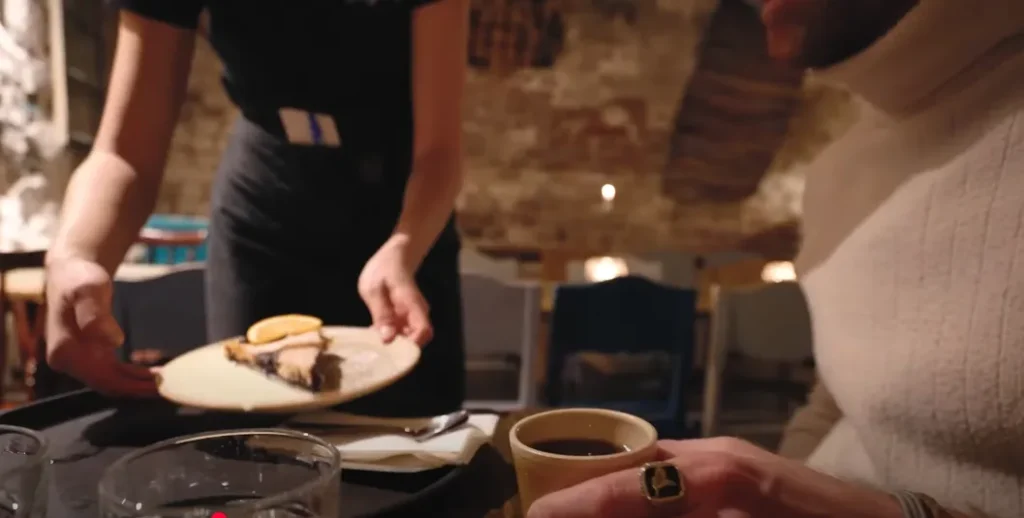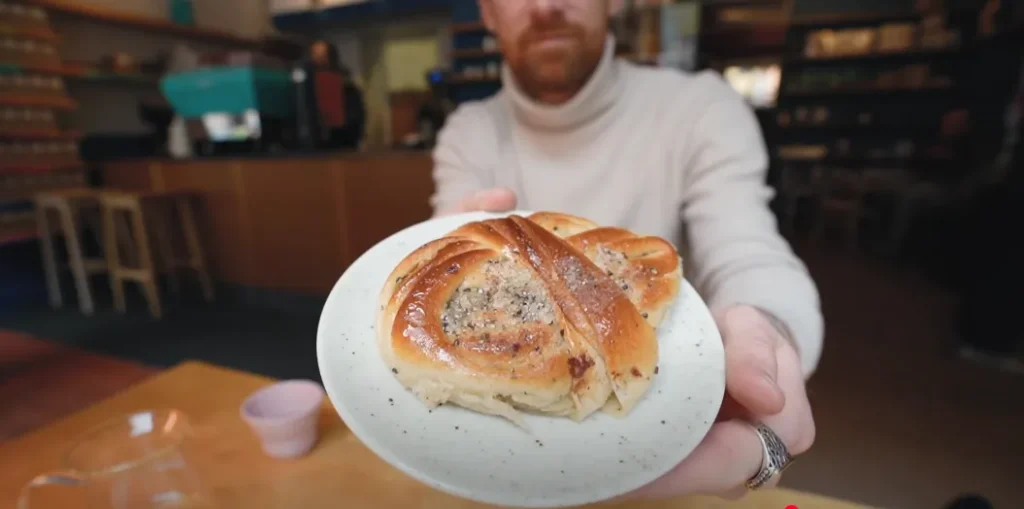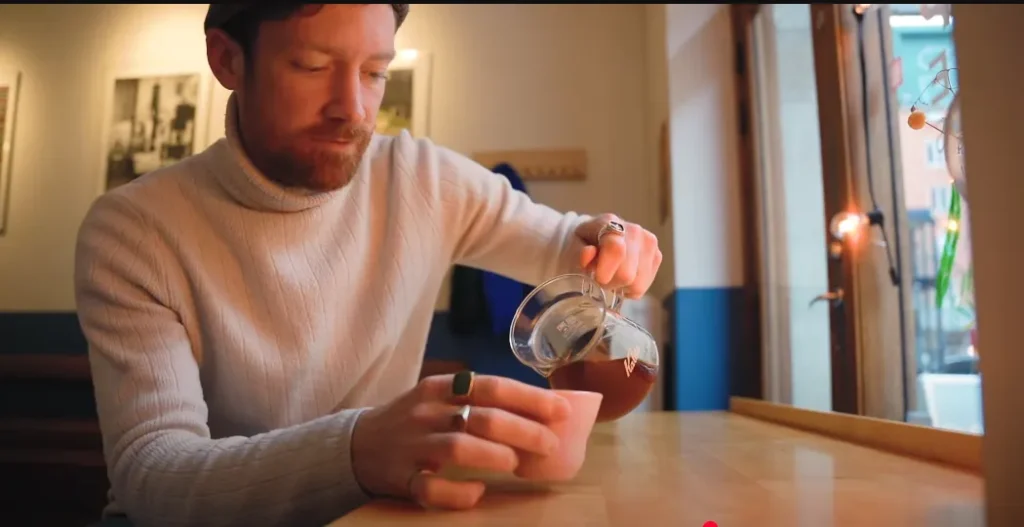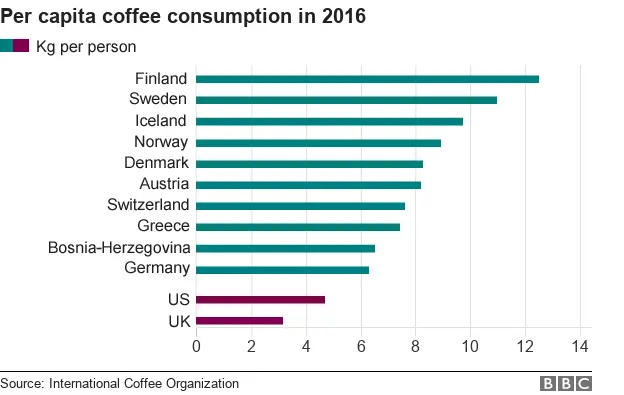“Fika is a Swedish tradition that involves a deliberate decision to take a break during the workday and usually involves pastries and coffee.” – International Journal of Gastronomy and Food Science (pmc.ncbi.nlm.nih.gov)
Coffee is a big part of life here in Sweden. Since I moved here. I realize how much Swedes love their coffee breaks, or “fika,” here. It’s not just a cup of coffee — it’s about sharing stories with friends and family. People meet there each day to chat, relax and share a coffee.
Swedish coffee is strong and flavorful, and the pairing works well with a sweet pastry, such as a cinnamon bun. I have really come to embrace this tradition. Here on the blog, I want to tell you what’s so unique about Swedish coffee culture. If you’re a coffee lover or just curious, I know you’ll find it as shocking as I did when I first tried it!

Introduction To Swedish Coffee
It is one of the leading coffee-consuming countries in the world. But the drink is more than a beverage for Swedes. It’s something in their culture and daily life.
Swedish people love coffee, but in a relaxed, slow manner. The vast majority of people prefer a medium roast coffee, which has a smooth flavor and a nice blend of flavor and acidity. They like how nice and flavorful the food tastes.
Coffee in Sweden is also social glue. One particularly Swedish tradition is called “fika. This is a pause when people drink coffee and eat something sweet, say, a pastry. Fika is an opportunity to chat, chill and bond with others.
Most Swedes prefer to drink their coffee black, but some like to add milk or sugar. Whatever the form, the intention is to take pleasure in lovely coffee.
When it comes down to it, though, coffee in Sweden is about more than what you drink. It’s about hanging out, spending time and making the everyday moments feel special.
Overview of Swedish Coffee Culture
Swedish coffee culture is warm and welcoming. It does so with attention to good quality and time-honored traditions. In Sweden, coffee isn’t merely a drink — it’s an experience.
Fika is one of Swedish’s most important traditions. Fika is the breaking of bread over coffee and pastries with others. It’s a privileged time of day for relaxing, talking, getting refreshed.
This special love for coffee is also reflected in our method of brewing the beverage. Swedes do it differently: drip coffee, for example, or espresso. They have had fun experimenting with various styles, but one thing remains consistent — they are passionate about great coffee an want to share this experience with others.
Traditional Swedish Coffee
Coffee has been an important part of Swedish life for a very long time. Swedes really love their coffee and the process of making it. To them, it’s not just about the flavor — it’s about the experience and how the coffee is made.
Kaffepanna
The Kaffepanna is a traditional Swedish coffee pot. It is usually made of copper or enamel. This pot is crucial for making coffee over an open fire. The pot has a long spout and a handle, making it easy to pour. The coffee made in a Kaffepanna has a distinct, rich flavor. It’s perfect for enjoying during outdoor activities like camping. Swedes have used this method for centuries. The process is simple but adds a unique touch to the coffee experience.
Egg Coffee
Egg Coffee is another traditional Swedish coffee method. This recipe involves cracking an egg and mixing it with coffee grounds. The mixture is then added to boiling water. The egg helps to clarify the coffee. It removes bitterness and makes the coffee smooth. The result is a clear, flavorful cup of coffee. Many Swedes enjoy this method, especially in rural areas. It’s a unique, old-fashioned way to make coffee that continues to be popular today.
Fika Tradition
In Sweden Fika is a social custom. Fika is more than just a coffee break. It’s a moment to pause, relax, and connect with friends or colleagues. The concept of fika is deeply rooted in Swedish culture.
What Is Fika?

Fika is a Swedish term that means taking a break with coffee and a treat. It’s a time to slow down and enjoy the moment. Both in homes and workplaces, fika is a common practice. It usually happens twice a day, once in the morning and once in the afternoon. It involves drinking coffee, eating pastries, and chatting with others.
Fika Etiquette
Fika has its own set of unwritten rules. Being punctual is important. If you are invited to fika, try not to be late. Bringing something to share, like cookies or buns, is appreciated. During fika, the focus is on relaxation and conversation. Work talk should be minimal. The idea is to build relationships and enjoy the break. Also, everyone should take part in cleaning up after fika.
Understanding and respecting these customs can make your fika experience better. Embrace fika and you’ll get a taste of Swedish life.
Popular Coffee Drinks
Sweden has a rich coffee culture. The Swedes love their coffee, and they have several popular coffee drinks. In this section, we will explore some of these favorites. Let’s delve into two of the most beloved coffee drinks in Sweden.

Brewed Coffee
Brewed coffee is a staple in Swedish households. It is known for its simplicity and rich taste. Swedish brewed coffee is usually made using a drip coffee maker or a French press.
Here are some key points about brewed coffee in Sweden:
Strong flavor: Swedes prefer their coffee strong and black.
Fika tradition: Brewed coffee is central to the Swedish fika, a coffee break with friends.
Quality beans: Swedes often choose high-quality coffee beans for brewing.
Café Au Lait
Café au lait is another favorite in Sweden. This drink is a mixture of brewed coffee and steamed milk. It is smooth and creamy, making it perfect for a cozy afternoon.
Here are some highlights of café au lait:
Equal parts coffee and milk: This creates a balanced flavor.
Mild and creamy: The steamed milk softens the strong coffee taste.
Popular in cafes: Many Swedish cafes serve this delightful drink.
Sweden’s love for coffee is evident in these popular drinks. Whether you prefer the strong taste of brewed coffee or the creamy texture of café au lait, there’s something for every coffee lover in Sweden.
Specialty Coffee Trends
Sweden has embraced specialty coffee. This trend is growing fast. Coffee lovers seek unique flavors and high-quality beans. Specialty coffee shops are popping up everywhere. They offer a different coffee experience.
Third Wave Coffee
The Third Wave Coffee movement is big in Sweden. It focuses on quality and sustainability. This movement treats coffee as an artisanal product. Baristas pay attention to every detail. They ensure each cup is perfect. The coffee is often single-origin. This means the beans come from one place. You can taste the unique flavors of that region.
Local Roasters
Local roasters are key to Sweden’s coffee scene. They source beans directly from farmers. This ensures freshness and fair trade. Each roaster has a unique style. Some focus on light roasts, others on dark. They often roast in small batches. This allows for better control over the flavor.
|
Roaster |
Specialty |
Location |
|---|---|---|
|
Drop Coffee |
Light Roasts |
Stockholm |
|
Johan & Nyström |
Single-Origin |
Stockholm |
|
Love Coffee Roasters |
Fair Trade |
Lund |
Sweden’s coffee culture is rich and diverse. Specialty coffee trends are a big part of it. From Third Wave Coffee to local roasters, there’s something for every coffee lover.
Swedish Coffee Brands
Sweden is known for its rich coffee culture. Swedish coffee brands offer a unique and delightful experience. Many Swedes enjoy their coffee strong and flavorful. Let’s explore some popular Swedish coffee brands.
Gevalia
Gevalia is one of the most well-known coffee brands in Sweden. It was founded in 1853. Gevalia has a long history of producing high-quality coffee. The brand offers a variety of blends. These include dark roasts and lighter options. Gevalia’s coffee is known for its rich taste and smooth finish. Many coffee lovers appreciate its distinct flavors.
Gevalia sources its beans from various regions. This ensures a diverse flavor profile. The brand focuses on sustainability and ethical sourcing. Gevalia’s commitment to quality makes it a popular choice among Swedes.
Löfbergs
Löfbergs is another leading coffee brand in Sweden. Established in 1906, it has a strong reputation for excellence. Löfbergs offers a range of coffee products. These include ground coffee, whole beans, and capsules. The brand is family-owned and operated. Löfbergs places a strong emphasis on sustainability. The company is involved in various environmental initiatives.
Löfbergs’ coffee is known for its bold flavors and rich aroma. It is a favorite among many Swedish households. The brand’s dedication to quality and sustainability sets it apart. Löfbergs continues to innovate and expand its product range. This ensures there is something for every coffee lover.
In summary, Swedish coffee brands like Gevalia and Löfbergs offer unique and delightful experiences. Their commitment to quality and sustainability is evident in every cup. Whether you prefer a strong, bold coffee or a smoother blend, these brands have something to offer.
Coffee Consumption Habits
Sweden’s love for coffee is well-known. Coffee consumption is not just a habit, but a cherished tradition. Swedes enjoy their coffee at various times of the day and in different social settings. Let’s explore their coffee consumption habits.
Daily Routine
For many Swedes, coffee is a part of the daily routine. They start their mornings with a strong cup of coffee. This helps them kickstart their day. Coffee breaks, known as “fika,” are also a daily ritual. Fika involves enjoying coffee with a sweet treat. It occurs mid-morning and mid-afternoon. People pause work and relax with colleagues or friends. This break fosters a sense of community and well-being.
Social Gatherings
Coffee is central to social gatherings in Sweden. Whether at home or in cafes, coffee is always served. Friends and family often gather over coffee. They chat, catch up, and enjoy each other’s company. Special occasions and celebrations also feature coffee. It’s a tradition to offer coffee to guests. This habit strengthens bonds and creates lasting memories.
Impact Of Coffee On Swedish Society
Coffee holds a special place in Swedish culture. It’s more than just a drink; it’s a tradition. Swedes enjoy coffee breaks, known as ‘fika’. This ritual is about taking a pause, savoring the moment, and connecting with others. But coffee’s influence goes beyond social gatherings. Let’s explore its broader impact on Swedish society.
Economic Influence
Coffee plays a significant role in Sweden’s economy. The country is among the top coffee consumers in the world. This high demand supports a thriving coffee industry. From local cafes to international brands, coffee businesses flourish. They create jobs and contribute to the economy. Importers, roasters, and baristas all benefit from this coffee culture.
Sweden also hosts many coffee-related events. These events attract tourists and coffee enthusiasts. They boost local economies and promote Swedish coffee culture globally. Small businesses, in particular, gain visibility and new customers. Coffee is not just a drink; it’s an economic driver.
Health Perspectives
Coffee also impacts health in Sweden. Many Swedes drink coffee daily. Research shows moderate coffee consumption can have health benefits. It can improve alertness and concentration. Some studies suggest it may lower the risk of certain diseases. These include type 2 diabetes and Parkinson’s disease.
But like anything, moderation is key. Too much coffee can lead to negative effects. These include insomnia and increased heart rate. Swedes are aware of this balance. They enjoy their coffee, but they do so mindfully.
In summary, coffee is integral to Swedish society. It influences the economy and affects health. This beloved beverage continues to shape daily life in Sweden.

Frequently Asked Questions
What Is The Most Popular Coffee In Sweden?
The most popular coffee in Sweden is filter coffee. Swedes enjoy their coffee strong and black.
How Do Swedes Drink Their Coffee?
Swedes often drink their coffee black. They also enjoy it with a small treat, like a pastry.
Why Is Coffee Popular In Sweden?
Coffee is deeply ingrained in Swedish culture. The tradition of “fika,” a coffee break with friends, makes coffee essential.
What Brand Of Coffee Is Popular In Sweden?
Gevalia is a popular coffee brand in Sweden. It is known for its rich and robust flavors.
Conclusion
Swedes really love their coffee, and it’s easy to see why. Fika, the famous coffee break, is a cherished tradition. People enjoy a light-roast coffee, often with friends, and it’s a great way to relax and connect. Over the years, specialty coffee shops have grown in popularity, and local beans with unique flavors are becoming more common.
Whether you like a simple cup or a carefully crafted brew, Sweden has something for every coffee lover. The coffee culture here keeps growing, and it’s a fun experience for anyone who enjoys coffee. So, grab your cup and join in on this wonderful tradition!






